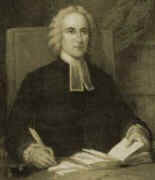 Jonathan
Edwards, the greatest theologian and philosopher of British American
Puritanism, stimulator of the religious revival known as the "Great
Awakening," and one of the forerunners of the age of Protestant
missionary expansion in the 19th century. Edwards' father, Timothy, was
pastor of the church at East Windsor, Conn.; his mother, Esther, was a
daughter of Solomon Stoddard, pastor of the church at Northampton, Mass.
Jonathan was the fifth child and only son among 11 children; he grew up in
an atmosphere of Puritan piety, affection, and learning. After a rigorous
schooling at home, he entered Yale College in New Haven, Conn., at the age
of 13. He was graduated in 1720 but remained at New Haven for two years,
studying divinity. After a brief New York pastorate (1722-23), he received
the M.A. degree in 1723; during most of 1724-26 he was a tutor at Yale. In
1727 he became his grandfather's colleague at Northampton. In the same
year, he married Sarah Pierrepont, who combined a deep, often ecstatic,
piety with personal winsomeness and practical good sense. Jonathan
Edwards, the greatest theologian and philosopher of British American
Puritanism, stimulator of the religious revival known as the "Great
Awakening," and one of the forerunners of the age of Protestant
missionary expansion in the 19th century. Edwards' father, Timothy, was
pastor of the church at East Windsor, Conn.; his mother, Esther, was a
daughter of Solomon Stoddard, pastor of the church at Northampton, Mass.
Jonathan was the fifth child and only son among 11 children; he grew up in
an atmosphere of Puritan piety, affection, and learning. After a rigorous
schooling at home, he entered Yale College in New Haven, Conn., at the age
of 13. He was graduated in 1720 but remained at New Haven for two years,
studying divinity. After a brief New York pastorate (1722-23), he received
the M.A. degree in 1723; during most of 1724-26 he was a tutor at Yale. In
1727 he became his grandfather's colleague at Northampton. In the same
year, he married Sarah Pierrepont, who combined a deep, often ecstatic,
piety with personal winsomeness and practical good sense.
Under the influence of Edwards's powerful preaching, the Great Awakening occurred in 1734-35, and a geographically more extensive revival in 1740-41. Edwards became a firm friend of George Whitefield, then itinerating in America. After various differences with prominent families in his congregation, and a prolonged controversy over the question of the admission of the unconverted to the Lord's Supper, he was dismissed as pastor in 1750 and became, in 1751, pastor of the church in the frontier town of Stockbridge, and a missionary to the Indians. He was elected president of Princeton in 1757, but was reluctant to accept because of his desire to continue writing. Finally yielding to pressure, he was inaugurated in February 1758. One month later he died of the effects of a smallpox injection. Edwards was, and was content to be, firmly in the tradition of New England Calvinism and the Westminster Divines. Efforts to demonstrate that he consciously shifted away from this position do not carry conviction. The influence of the "new way of ideas" of John Locke was mainly confined to his anthropology and is clearest in Edwards's classic Freedom of the Will. Because of his commitment to salvation by sovereign grace, Edwards was agitated by what he considered to be the religiously destructive developments in New England, particularly incipient Arminianism and Socinianism, and revivalistic excess.
|